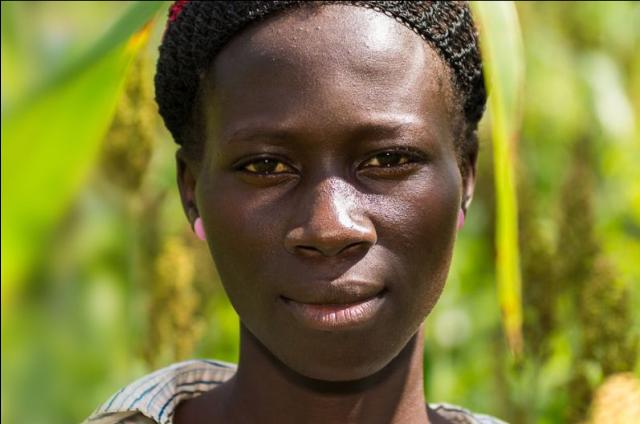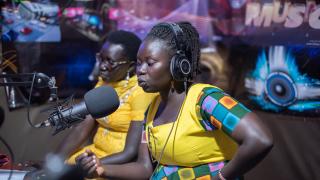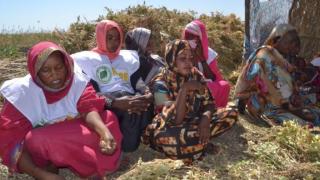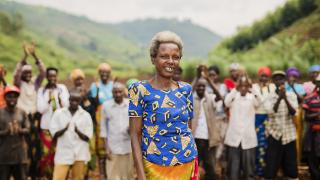One Year Into the Conflict, Do Not Forget the Women of Sudan
One Year Into the Conflict, Do Not Forget the Women of Sudan
Story shared by Fatima, Executive Director of Zenab for Women in Sudan, a partner organisation of Women for Women International
The situation in Sudan, my home country, is rapidly deteriorating. I have witnessed the devastating impacts of conflict on once-thriving communities, who are now caught in a cycle of hunger, sexual violence, disease, and death.
Last year when conflict erupted between the Sudanese Armed Forces (SAF) and the paramilitary Rapid Support Forces (RSF) in Sudan, I had to make a difficult decision to flee to Egypt. I work as the Executive Director of a Sudanese women’s rights organisation called Zenab for Women Development and have been a vocal advocate for women’s rights. Activists like me are being targeted for speaking out against injustices to the outside media. But I am determined to ensure that our mission of supporting women during this conflict continues without interruption. I echo their voices, largely unheard, despite their bravery, resilience and indispensable efforts to support local communities and the forcibly displaced.
As we approach the one-year mark since the start of the conflict in Sudan, the war has intensified and spread across different states, causing severe food shortage, forcing an alarming number of people to flee to other states and neighbouring countries.
According to a UN report, almost 18 million people across Sudan are facing acute hunger and are in dire need of food assistance. Furthermore, more than 7.4 million people have fled their homes, making Sudan the country with the largest number of displaced people in the world.
The situation has worsened in recent months, with the fighting spreading to Gezira state, the second-largest state in Sudan and home to Africa's largest agricultural project. At the beginning of the conflict, people fled to Gezira and set up camps for internally displaced persons, but now everyone, including the people of Gezira, has fled to further states such as Blue Nile, Gadaref, and Kassala. The country’s food food channels have been broken and it is difficult to transport it to other states.
Furthermore, the escalating war has led to an influx of people in the already overcrowded IDP camps. This has worsened the already dire situation, posing serious challenges such as limited access to food and water, inadequate sanitation and hygiene services, widespread malnutrition, and heightened risk of waterborne diseases. Also, due to the numerous security threats, it has become a challenge for organisations like mine to provide humanitarian assistance to families in IDP camps.
While men are left behind to fight, women and girls are forced to flee for safety reasons. While on the move, women struggle to access food for themselves and their children. Unfortunately, the food available is usually limited and less nutritious, which forces women and girls to eat last and consume less. Food scarcity has increased the risk of gender-based violence, including intimate partner violence, sexual exploitation and abuse, and drives harmful coping strategies, including child, early, and forced marriage.
There are reports of widespread rape and militia marrying young girls by force and turning them into slaves.
Sudanese women struggle to access lifesaving services such as sexual and reproductive healthcare, including clinical management of rape and access to emergency contraception, while the war decimates health facilities, and displacement and stigma are limiting access to health services. Women’s mental and psychological health is deteriorating, and some women express suicidal thoughts.
In the words of Hanan, who has been displaced twice by the conflict:
We are living in poor conditions with limited access to food, water and health services. I am not sure of what is going to happen, are we going to be displaced again? I feel so sad to see my kids living miserably without education, I feel so stressed.
Through a grant from Women for Women International, we provide food baskets and non-food essential items to 250 households in Gadaref state. These include hygiene kits for an estimated 500 women and girls. Additionally, we are raising awareness in the community around good nutrition, hygiene, sanitation, mental health, and protection.
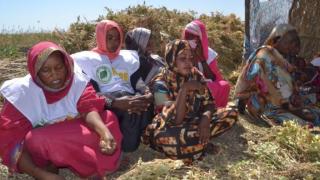
Through a grant from Women for Women International, we provide food baskets and non-food essential items to 250 households in Gadaref state. These include hygiene kits for an estimated 500 women and girls. Additionally, we are raising awareness in the community around good nutrition, hygiene, sanitation, mental health, and protection.
As a women-led organisation, we are advocating for the international community's attention to address the dire situation in Sudan. Recently, I represented the women of Sudan and presented a briefing at the UN Security Council. During this briefing, I emphasised the urgent need for peace-building initiatives to be implemented immediately and for the people of Sudan to receive the much-needed assistance without any further delay.
The women of Sudan continue to rise, supporting their families and communities, risking their lives to do so.
Women’s rights and women-led organisations are a critical and indispensable pillar of frontline humanitarian response, despite very limited access to funding, technical assistance and staff care services.
I will continue to advocate for the people of Sudan – I urge the international community to act decisively in response to this crisis, calling for an immediate ceasefire and to lend their support in removing barriers that impact women’s organisations’ access to those most in need.
Learn more
After years of silent suffering, the women of South Sudan are beginning to speak out about rape and sexual violence. Read about how Change Agents are breaking the silence on Violence Against Women over the radio.
Conflict Response Fund in Sudan
subtitle:
Through our Conflict Response Fund we have so far identified two local women's rights organisations, Zenab for Women in Development and Sudanese Organisation for Research and Development whom we are partnering with to meet the most urgent needs of women.
Why women in conflict
subtitle:
When war and insecurity take hold, women bear the heaviest burden of violence, poverty and inequality. Learn more about why supporting women survivors of war is so important.

